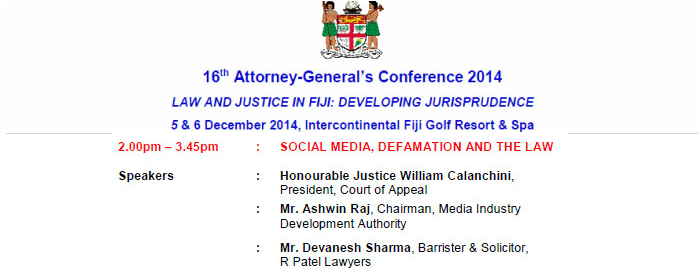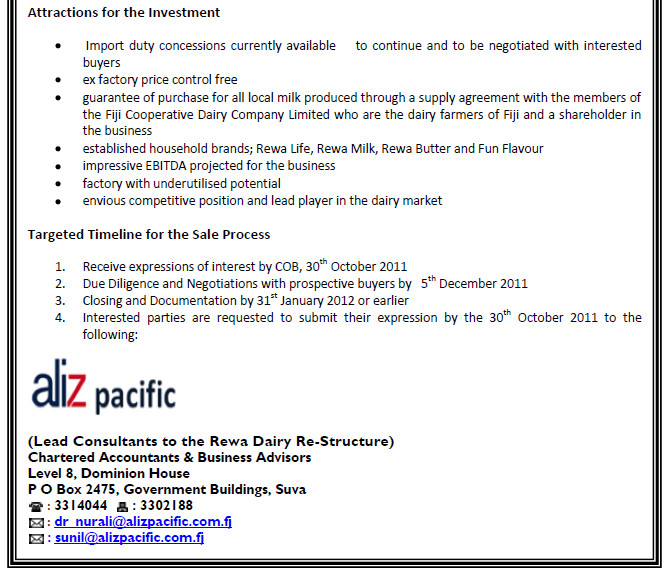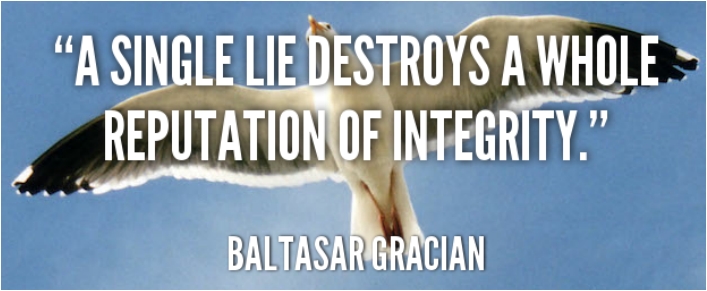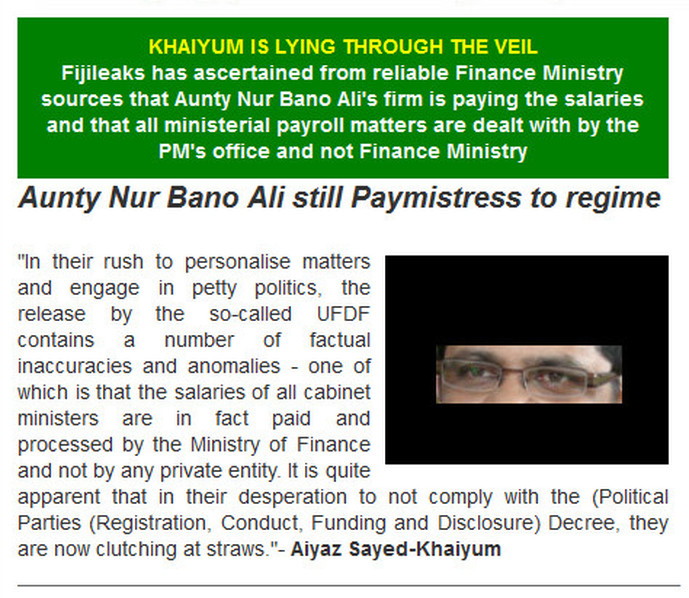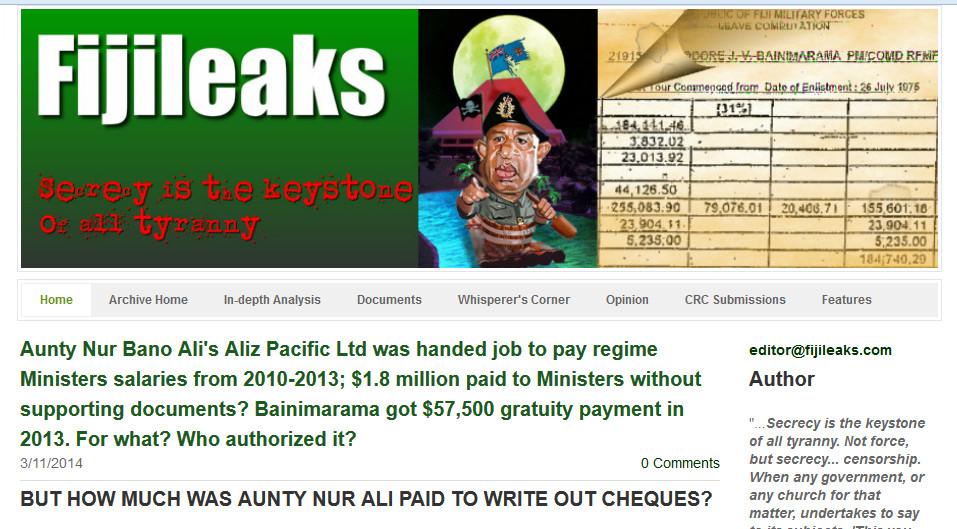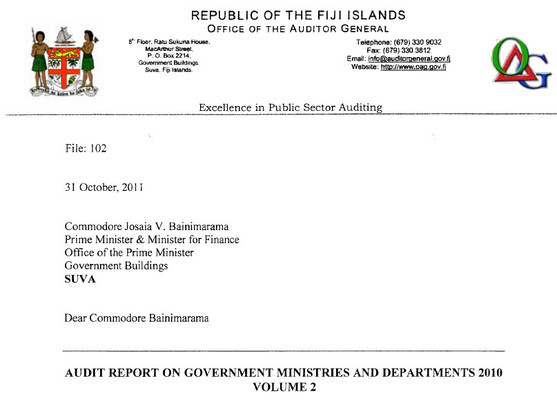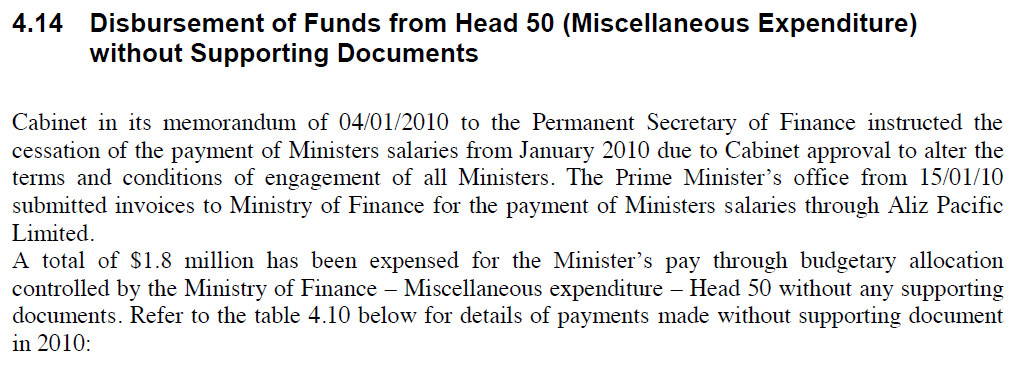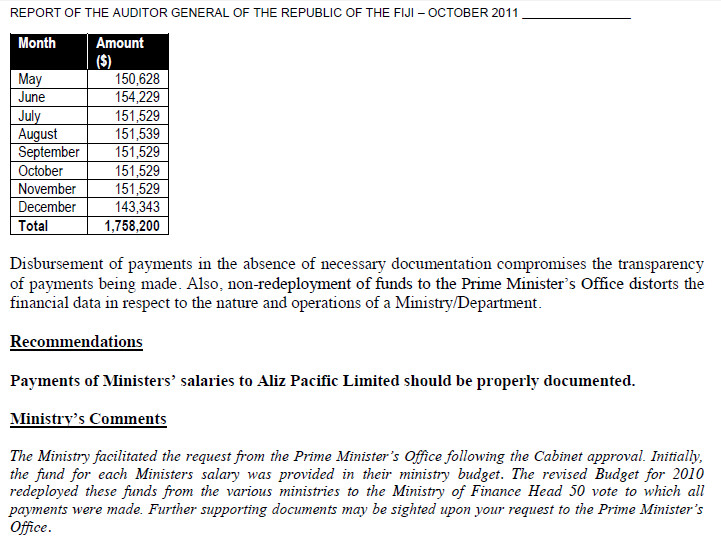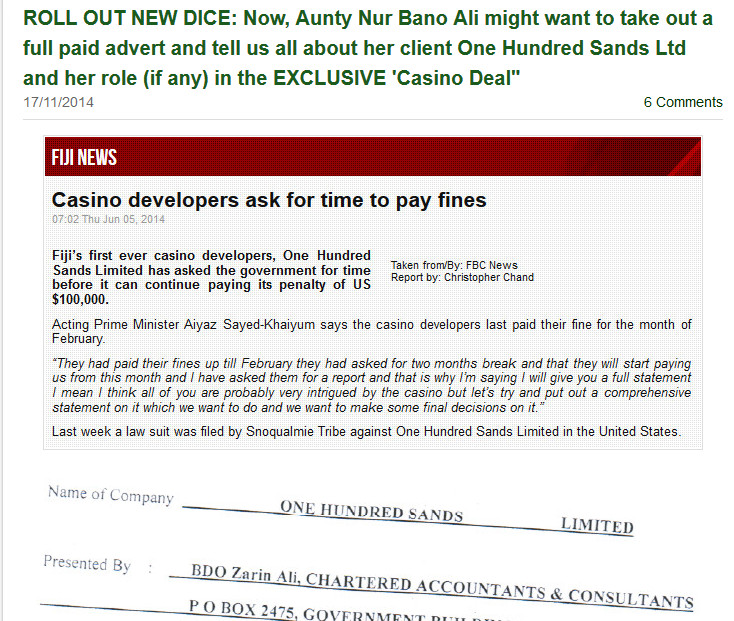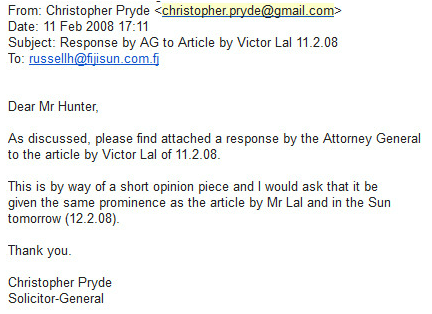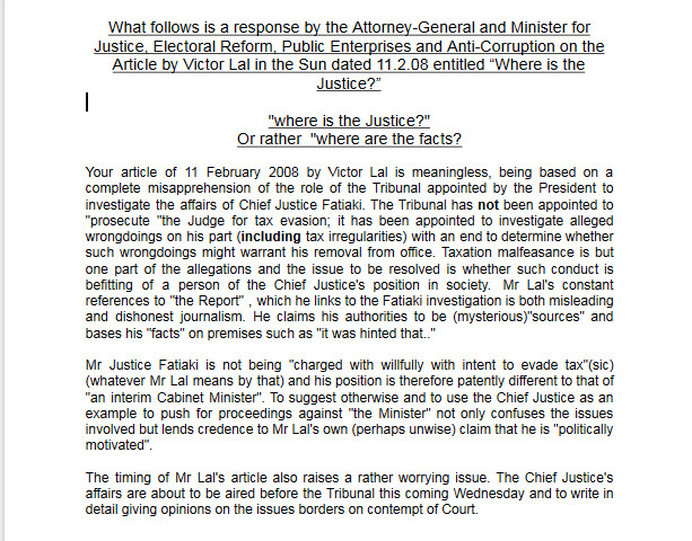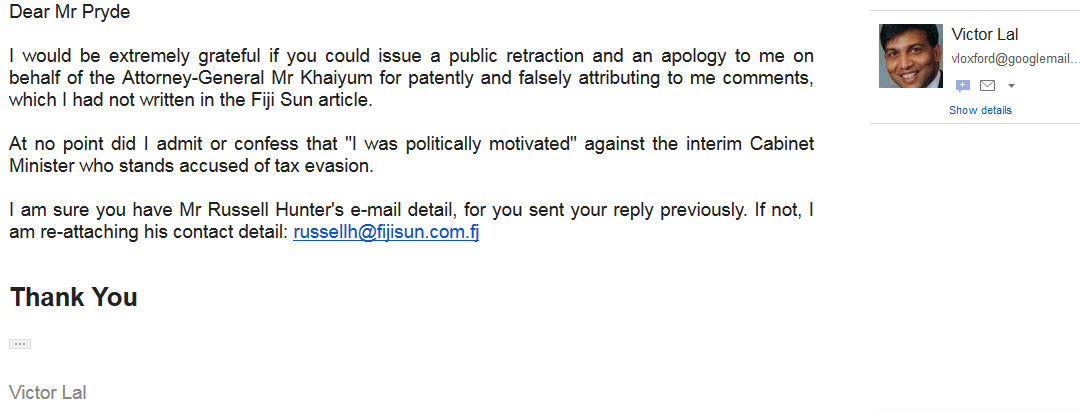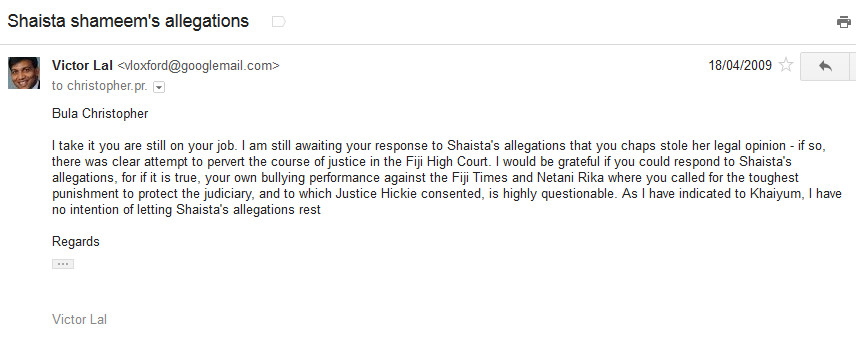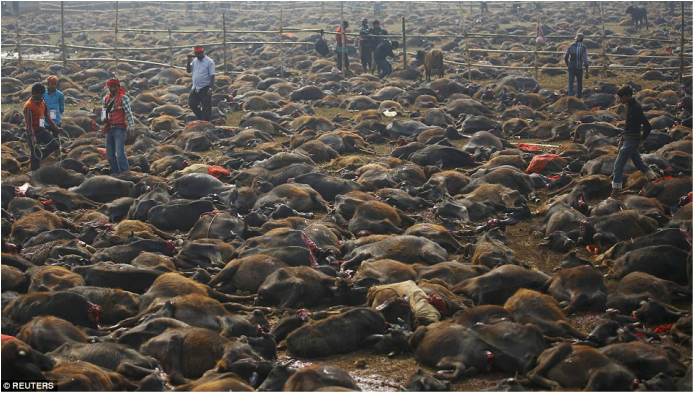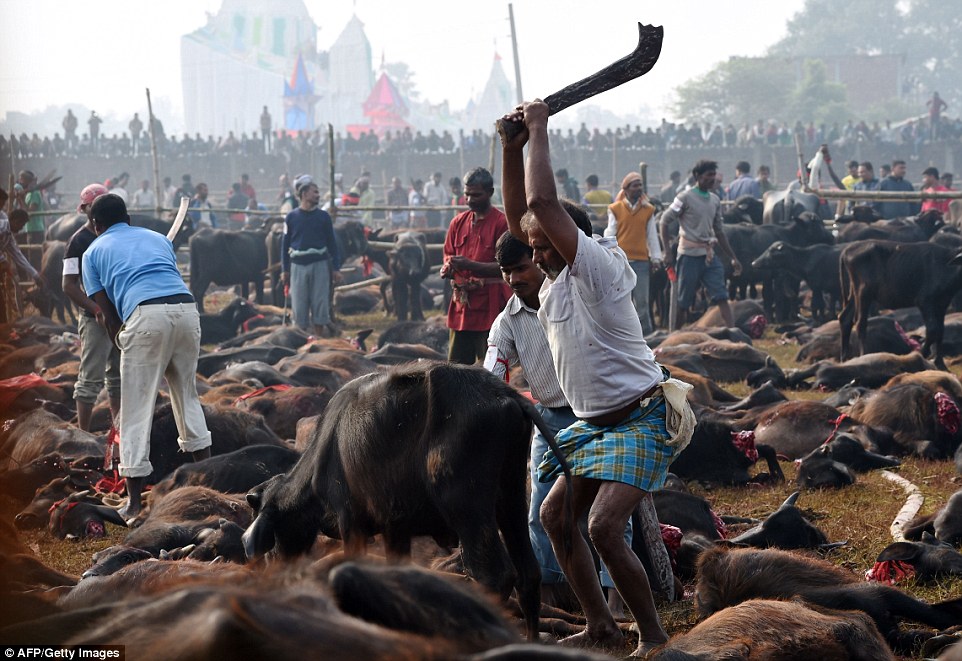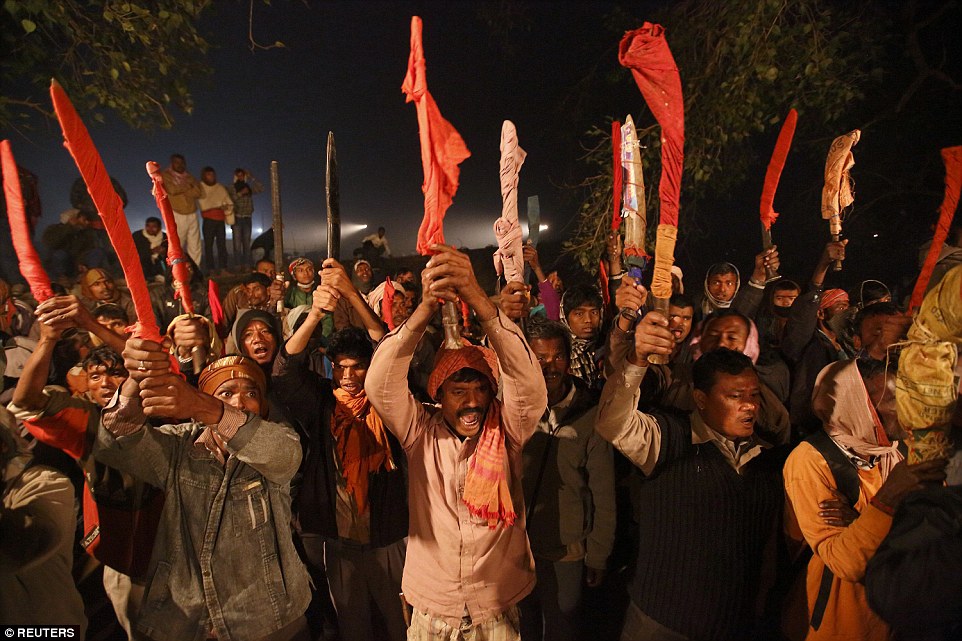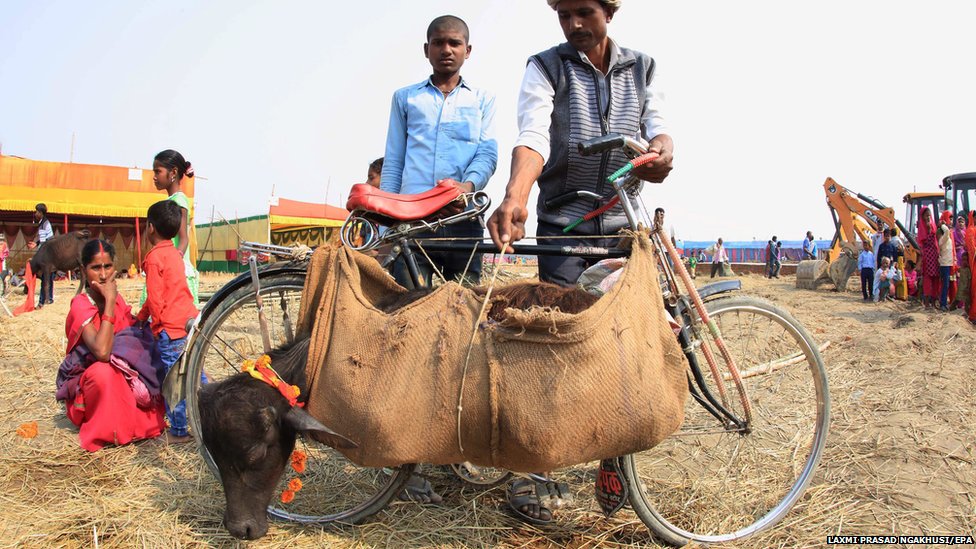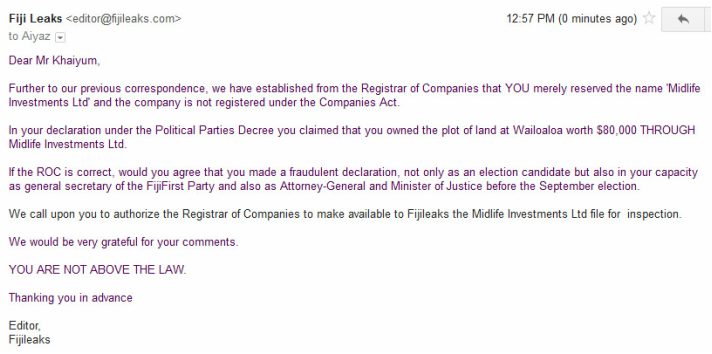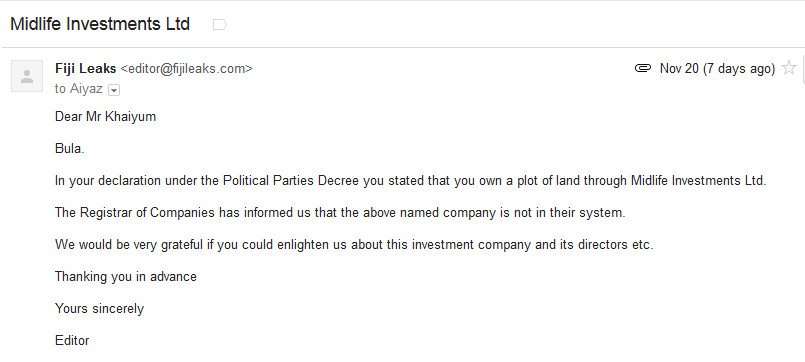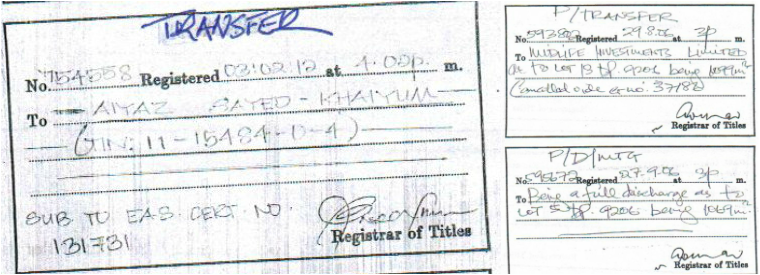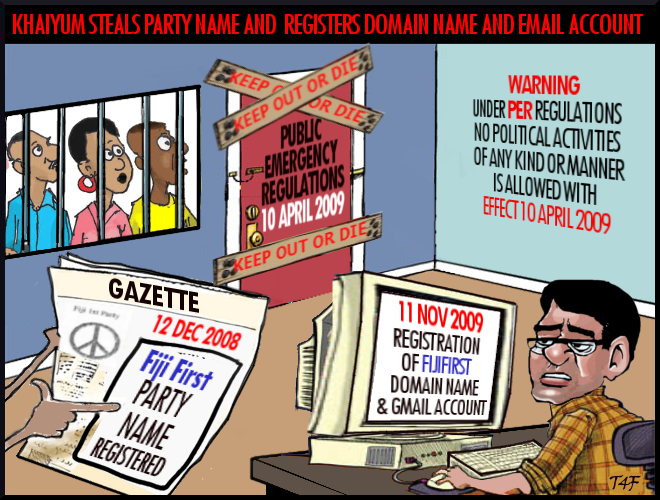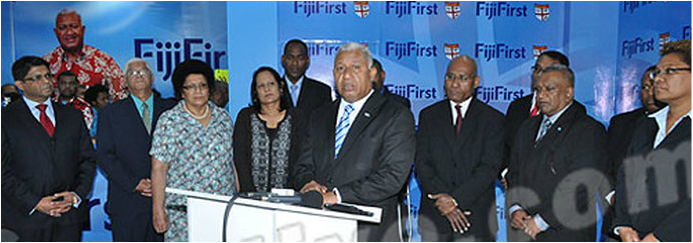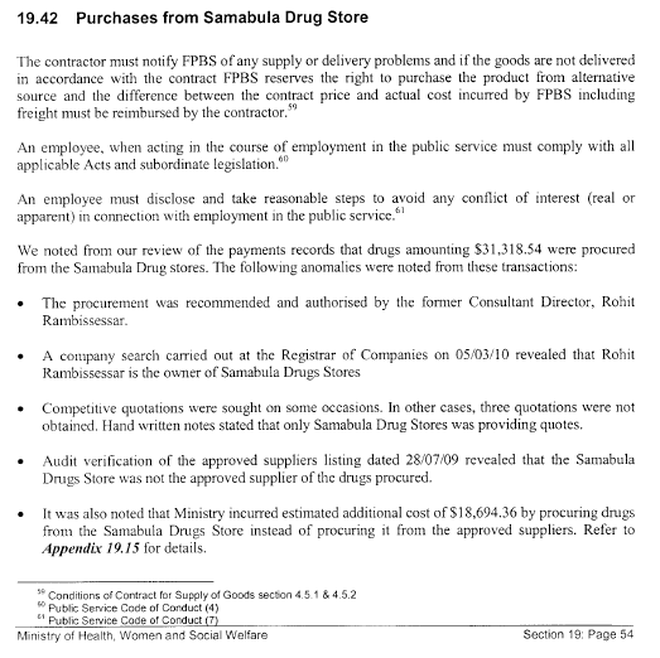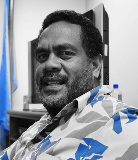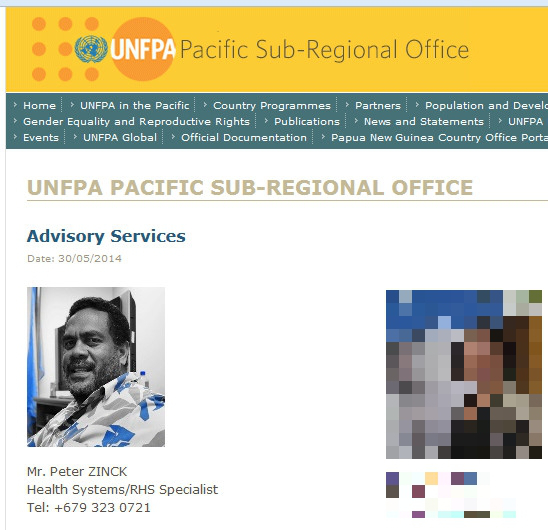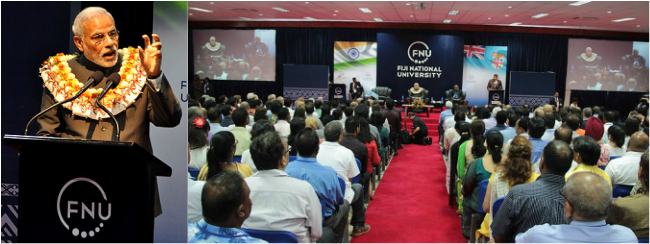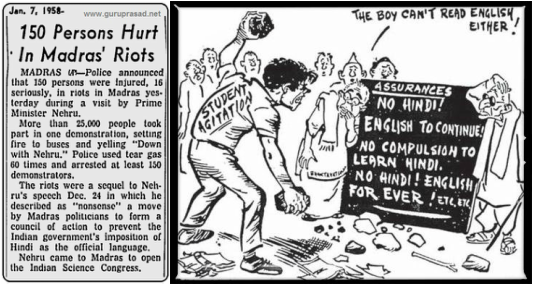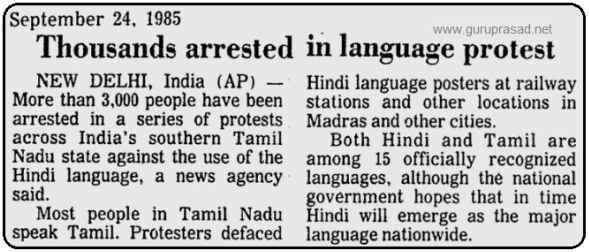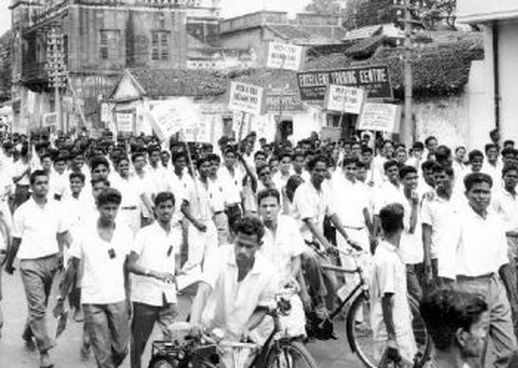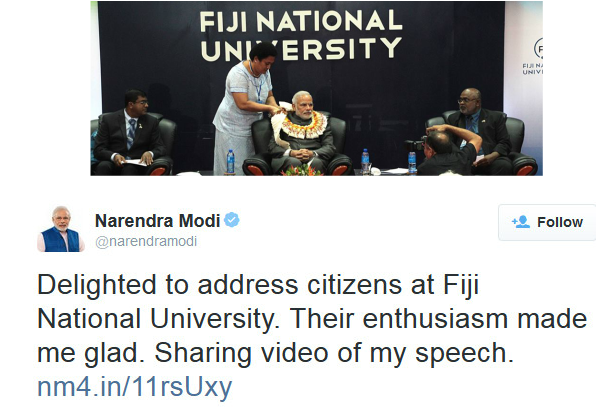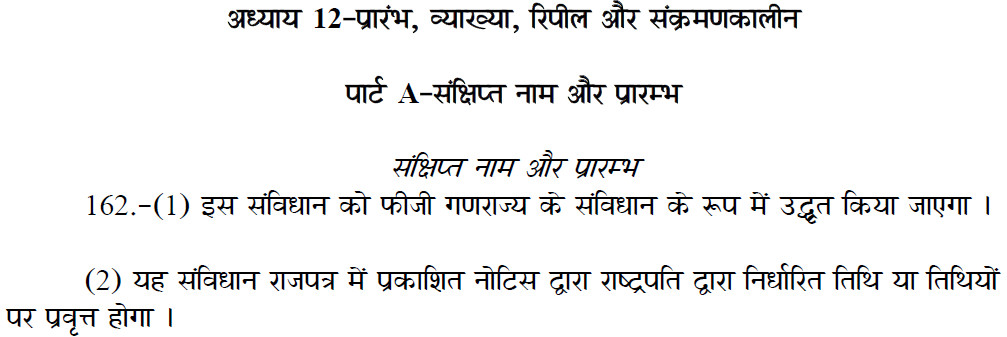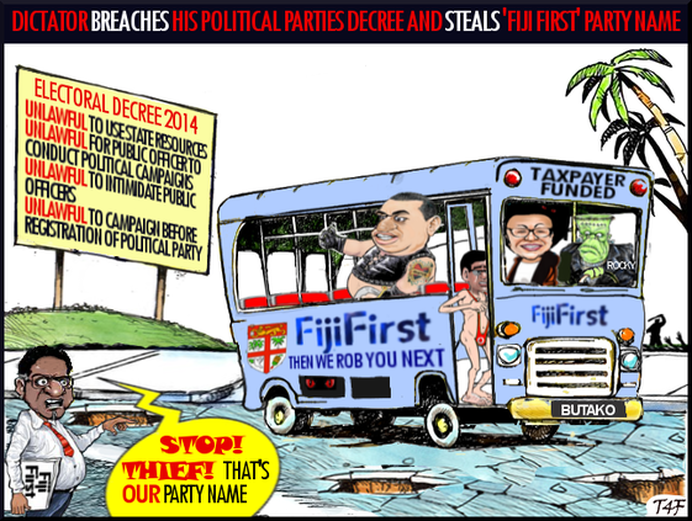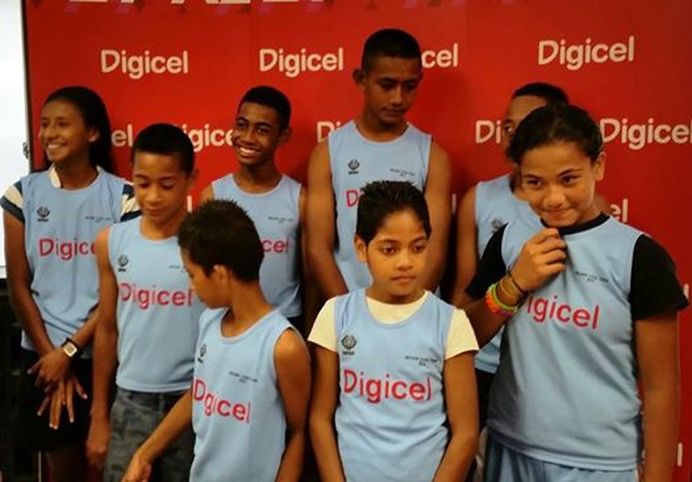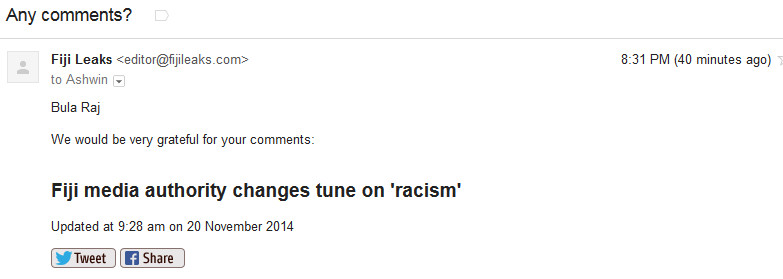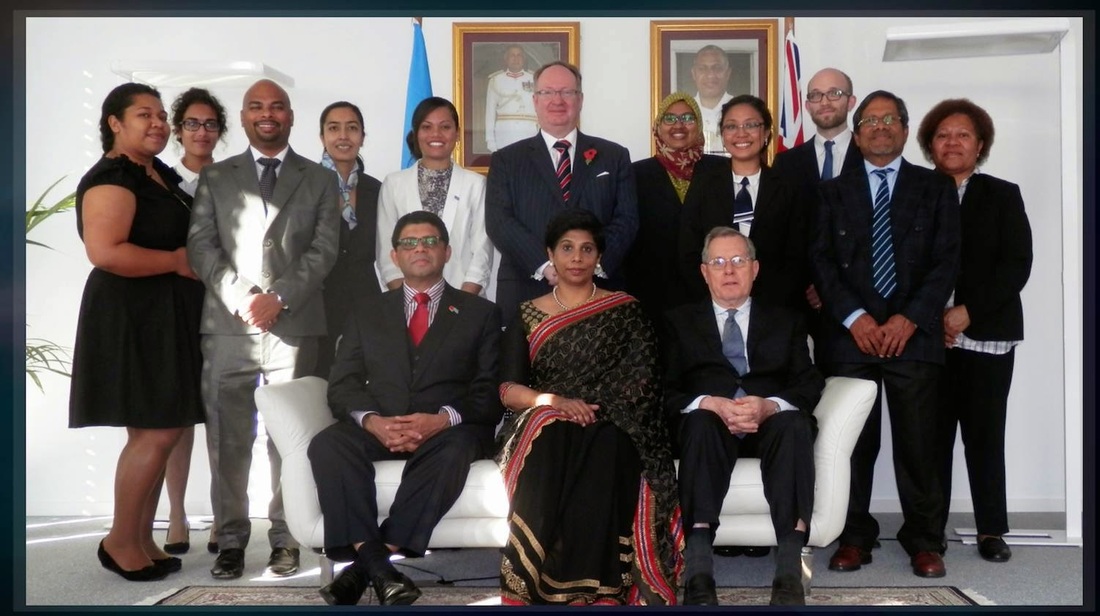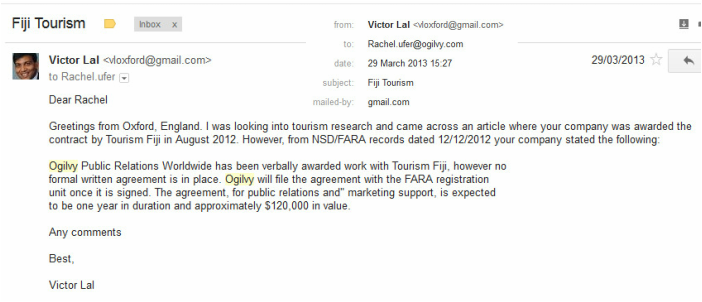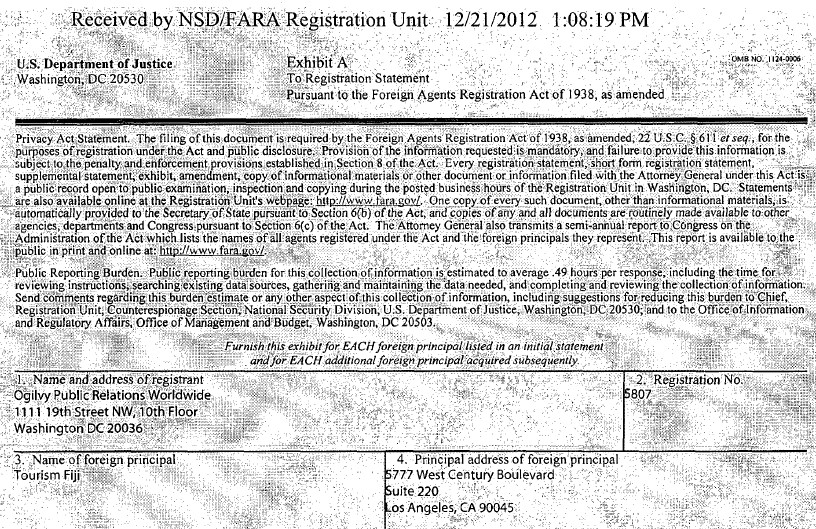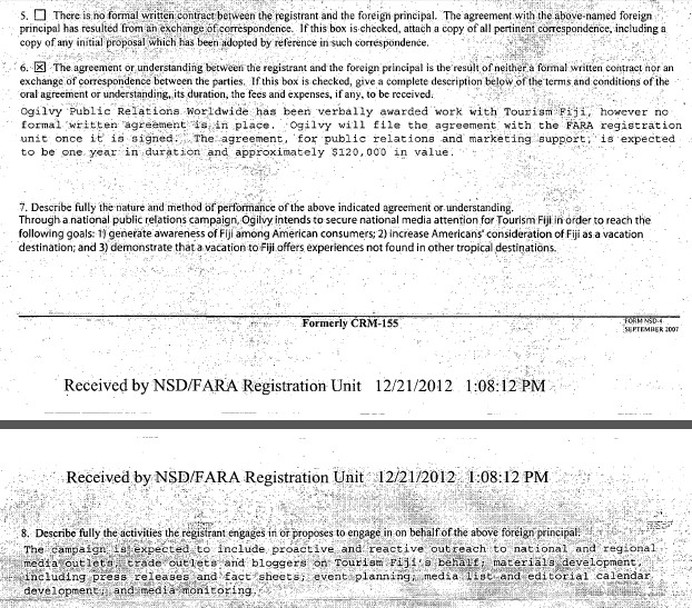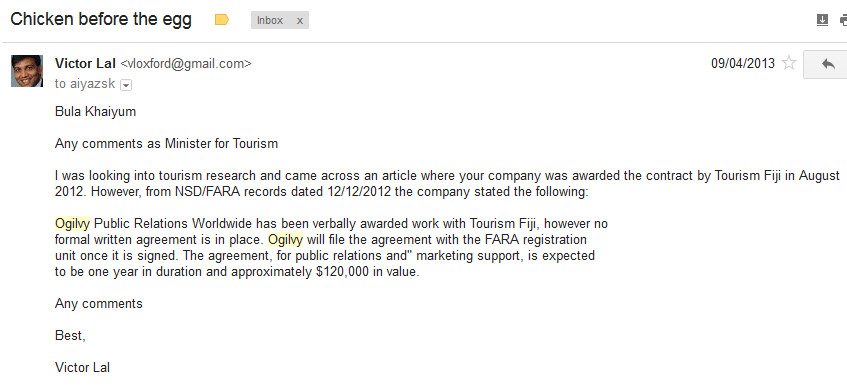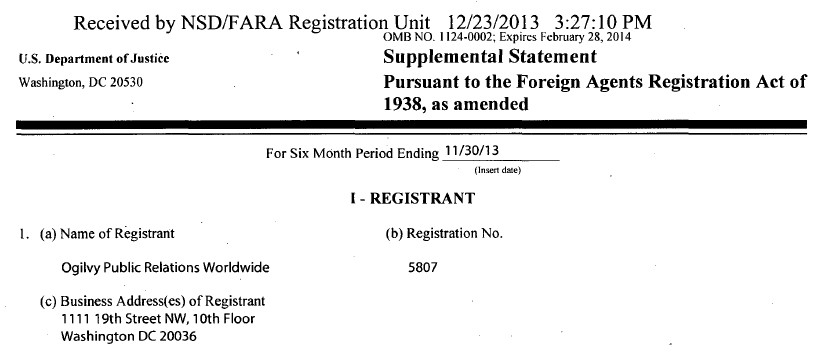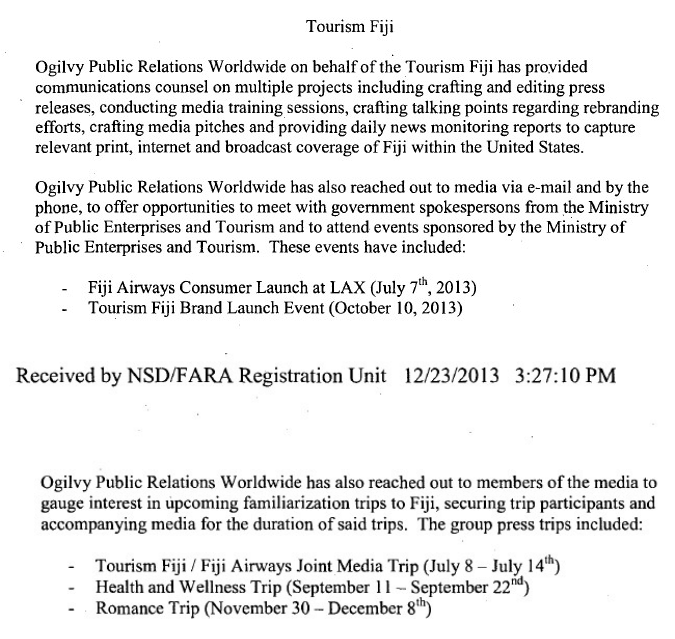Seven years later, Devanesh Sharma has no qualm speaking to the 16th Attorney-General's Conference on 5 December 2014, when one of the very lawyers who put his hand up to join the interim Bainimarama government as Attorney-General was Aiyaz Sayed Khaiyum:
A Fiji High Court Judge to Victor Lal, 6 March 2007, after Lal had revealed the confidential Minutes of the Judicial Services Commission that had seen Justice Anthony Gates appointed acting Chief Justice after the 5 December 2006 coup: "In the Sun yesterday. Shock waves as the lawyers had been grievously misled by the President [Devanesh Sharma, then president of Fiji Law Society]. He rang _____ accusing me of leaking the minutes which ______ refuted. A bit rich since he has been sending JSC correspondence to ______ of Fiji TV and to DVF (Chief Justice Daniel Fatiaki). Sir_____rang me up to say he was pleased the minutes were published in the public interest."
The former president of the Fiji Law Society, Devanesh Sharma, of R Patel Lawyers to Fiji Sun publisher Russell Hunter, 2007: "The article [STOP THE HYPOCRISY] published is factually incorrect, based on a contumelious (insolently abusive and humiliating) disreagrd [disregard] of the role and strcutre [structure] of the FLS and is clearely [clearly] grossly defamatory of me in my personal capacity as a barrister and solictor [solicitor] and an officer of the Court and in my capacity as President of the FLS; The article is vindictive and is intended to damage my professional and personal reputation and to cause me irreparable harm and ignominy in my personal life, my professional career and professional activities; I have been seriously hurt and embarrased by the publication of the Article..."
A Fiji High Court Judge to Victor Lal, 23 February 2007: "You have written the truth. How can that be wrong? You obviously got him where it hurts.The FLS [Fiji Law Society] has now suspended Rajendra Chaudhery's practising certificate for daring to criticise Sharma on national TV. The reason given is that such criticism is conduct unbecoming of a lawyer. Yet when ______ was criticised personally by _______ no action was taken by the FLS. Are some lawyers more equal than others?! Of course Sharma has the right to defend anyone he wants, but those involved in 2000 and 1987 appear prominently in his clientele, and his opposition to this coup is much stronger than the FLS reaction to the 2000 coup or to lawyers involved in it. In fact the only principled position for the FLS to take is to say that all lawyers are asked to remember their oaths as legal practitioners and to uphold the rule of law and the Constitution. As for what the lawful position is of the country, that is a matter to be determined by the courts. Now that the FLS has decided what is legal and what is illegal, how can it take a position of amicus in any court proceedings in relation to the coup? It has lost its objectivity. As for the army lawyers, the matter is now before the courts, but it appears that they were judged and punished before any determination that they had in fact advised the army to break the law. If we still don't know that the law was broken or the nature of the advice tendered, how can we say that the army lawyers are guilty of giving illegal advice? I think the FLS has lost logic as well as objectivity. "
Victor Lal to a Fiji High Court Judge, Monday 29 January, 2007 - Subject: Re: truth - Dear _____ He has sent another one to Fiji Sun, this time relating to my article STOP THE HYPOCRISY (14 December) as follows (see below; and also show it to ________ - any comments on the enclosed will be appreciated - its just to silence me)
Fijileaks Editor: Stung by the criticism, Sharma had sent in the following, demanding Fiji Sun apologize but as one High Court Judge wrote to Victor Lal, 'You have written the truth, how can that be wrong. You obviously got him where it hurts'.
Sharma to Fiji Sun:
The article published is factually incorrect, based on a contumelious disreagrd of the role and strcutre of
the FLS and is clearely grossly defamatory of me in my personal capacity as a barrister and solictor and an
officer of the Court and in my capacity as President of the FLS;
The article is vindictive and is intended to damage my professional and personal reputation and to cause me
irreparable harm and ignominy in my personal life, my professional career and professional activities;
I have been seriously hurt and embarrased by the publication of the Article; The article complained of in its natural and ordinary meaning contains the following imputations:
1. That I have personally taken action against
military lawyers
2. That I am a hypocrite
3. That I should be removed from the FLS
4. That the actions of the FLS in suspending the
certificates of certain solicitors is at my
instigation and personal directive
5. That as a defence lawyer who has defended persons
charged with offences related to the 2000 George
Speight takeover of parliament, I am tainted and have
a conflict of interest
6 That I have colluded with persons involved with the
events of 2000
7 That I have colluded with and am complicit in
alleged irregular dealings accociated with the release
under CSO of Ratu Jope Seniloli
8 That by being part of the defence team of Sitiveni
Rabuka in Mr Rabuka's recent trial for inciting
mutiny, I have condoned the actions of Mr Rabuka in
the coups of 1987
9 That by acting for Lt-Colonel Jone Baledrokadroka, I
am no longer qualified tothe comment on any actions
of any members of the military, and am biased against
the military
10. That I am unfit person to be President of the FLS
and should be "cleaned up" from the FLS
11. That I have colluded with the GCC
In this article, Lal demonstrates his total inability to comprehend the role of lawyers and the law. In particular Lal demonstrates a fundamental misunderstanding of the distinction between the role of a lawyer defending in a Court of Law those persons charged with offences against the Laws of this country, and the role of lawwyers advising and promoting a person or organisation in the illegal overthrow of a democratically elected Government. As Lal and your paper should be aware, lawyers are Officers of Court bound by rules of ethics and good conduct. A fundamental component of the ethical standards expected of a lwayer is adherence to the
laws of this country. Lawyers who break the law and commit illegal acts are liable to be disciplined by
the FLS. The tendering of advice to overthrow, by use of force, a democratically elected government, if such advice is given by members of the FLS, is sufficient justification for the FLS to conduct an investiagtion into the conduct of these members. Being part of an organisation that commits treason and other serious offences under the Penal Code without showig any respect for the laws of Fiji, or one's oath as a lawyer and an officer of the Court is further reason for the FLS to conduct such an investiagtion Furthremore, the FLS is a collective decision made by the duly elected Council of the FLS and is not my individual decision the As a supposedly responsible media organisation it is your responsibility to ensure that such vindictive falsities masquerading as journalism are not published. By publishing Lal's viperous outpourings, the Fiji SUN has participated in the gross defamation of myself. I invite you to publish at the earliest possible date, in a prominent position in your newspaper, an unequivocal apology to me in the following terms:
APOLOGY TO MR DEVANESH SHARMA, PRESIDENT, FIJI LAW SOCIETY:
On 14 December 2006 the Fiji Sun published an article which referred to Mr Devanesh Sharma. The Fiji Sun
unequivocally recognises that the statements it made referring to Mr Sharma were false and without foundation, and that the imputations contained within those statements were false. The Fiji Sun unreservedly apologises
to Mr Sharma for any hurt and embarrassment that the publication of the statements may have caused to him
Notwithstanding that the Fiji Sun may publish an apology in the form requested, I reserve my rights to claim damages and costs by reason of the publication. I put you on notice that your failure or refusal to publish the requested form or apology to me, will be relied upon as conduct aggravating the damages suffered by me because of the offending publication I request your immediate acknowledgement of receipt of
this letter.
Devanesh Sharma.
Sharma to Fiji Sun:
The article published is factually incorrect, based on a contumelious disreagrd of the role and strcutre of
the FLS and is clearely grossly defamatory of me in my personal capacity as a barrister and solictor and an
officer of the Court and in my capacity as President of the FLS;
The article is vindictive and is intended to damage my professional and personal reputation and to cause me
irreparable harm and ignominy in my personal life, my professional career and professional activities;
I have been seriously hurt and embarrased by the publication of the Article; The article complained of in its natural and ordinary meaning contains the following imputations:
1. That I have personally taken action against
military lawyers
2. That I am a hypocrite
3. That I should be removed from the FLS
4. That the actions of the FLS in suspending the
certificates of certain solicitors is at my
instigation and personal directive
5. That as a defence lawyer who has defended persons
charged with offences related to the 2000 George
Speight takeover of parliament, I am tainted and have
a conflict of interest
6 That I have colluded with persons involved with the
events of 2000
7 That I have colluded with and am complicit in
alleged irregular dealings accociated with the release
under CSO of Ratu Jope Seniloli
8 That by being part of the defence team of Sitiveni
Rabuka in Mr Rabuka's recent trial for inciting
mutiny, I have condoned the actions of Mr Rabuka in
the coups of 1987
9 That by acting for Lt-Colonel Jone Baledrokadroka, I
am no longer qualified tothe comment on any actions
of any members of the military, and am biased against
the military
10. That I am unfit person to be President of the FLS
and should be "cleaned up" from the FLS
11. That I have colluded with the GCC
In this article, Lal demonstrates his total inability to comprehend the role of lawyers and the law. In particular Lal demonstrates a fundamental misunderstanding of the distinction between the role of a lawyer defending in a Court of Law those persons charged with offences against the Laws of this country, and the role of lawwyers advising and promoting a person or organisation in the illegal overthrow of a democratically elected Government. As Lal and your paper should be aware, lawyers are Officers of Court bound by rules of ethics and good conduct. A fundamental component of the ethical standards expected of a lwayer is adherence to the
laws of this country. Lawyers who break the law and commit illegal acts are liable to be disciplined by
the FLS. The tendering of advice to overthrow, by use of force, a democratically elected government, if such advice is given by members of the FLS, is sufficient justification for the FLS to conduct an investiagtion into the conduct of these members. Being part of an organisation that commits treason and other serious offences under the Penal Code without showig any respect for the laws of Fiji, or one's oath as a lawyer and an officer of the Court is further reason for the FLS to conduct such an investiagtion Furthremore, the FLS is a collective decision made by the duly elected Council of the FLS and is not my individual decision the As a supposedly responsible media organisation it is your responsibility to ensure that such vindictive falsities masquerading as journalism are not published. By publishing Lal's viperous outpourings, the Fiji SUN has participated in the gross defamation of myself. I invite you to publish at the earliest possible date, in a prominent position in your newspaper, an unequivocal apology to me in the following terms:
APOLOGY TO MR DEVANESH SHARMA, PRESIDENT, FIJI LAW SOCIETY:
On 14 December 2006 the Fiji Sun published an article which referred to Mr Devanesh Sharma. The Fiji Sun
unequivocally recognises that the statements it made referring to Mr Sharma were false and without foundation, and that the imputations contained within those statements were false. The Fiji Sun unreservedly apologises
to Mr Sharma for any hurt and embarrassment that the publication of the statements may have caused to him
Notwithstanding that the Fiji Sun may publish an apology in the form requested, I reserve my rights to claim damages and costs by reason of the publication. I put you on notice that your failure or refusal to publish the requested form or apology to me, will be relied upon as conduct aggravating the damages suffered by me because of the offending publication I request your immediate acknowledgement of receipt of
this letter.
Devanesh Sharma.
HYPOCRISY TAINTS FIJI LAW SOCIETY LEADERSHIP
By VICTOR LAL
Fiji Sun, 15 December 2006
The president of the Fiji Law Society, Devanesh Sharma, has suspended military lawyers and is demanding to know what help, if any, they gave to Commodore Frank Bainimarama when he took over the Laisenia Qarase government on December 5.
He says these lawyers risk losing their practising certificates if they do not give a satisfactory explanation. He says the lawyers failed to uphold the law because in the opinion of the society, the coup is illegal.
Interestingly, the overthrown Prime Minister Qarase, shortly before he was deposed, questioned why the society was silent on the recent developments and was not speaking out with one voice, including their overseas counterparts. Sadly, when the former president of the society, Graham Leung, called on Mr Qarase in May 2005 to abandon the Reconciliation and Unity Bill because it posed a serious threat to the rule of law, undermined the independence of the judiciary, and was perhaps unconstitutional, Mr Qarase refused to listen.
Also, when the society called upon Mr Qarase to abide by the Court of Appeal decision and hand over power to Mahendra Chaudhry in 2001, Mr Qarase simply ignored the court ruling or the call from the legal fraternity.
Mr Sharma's actions against the military lawyers, however, raise some very fundamental and disturbing questions: what role should a lawyer play in society or to what extent must he or she provide legal advice to an institution to which he or she belongs; and why should there be two laws, one for fat pay lawyers in private practice and one for military lawyers?
Unlike the private lawyers, both civilian and military laws govern the military lawyers like their foot soldier colleagues. However, as part of their employment, they were required by military law to tender legal advice to their military boss, the Commodore on the Doctrine of Necessity. It was up to the Commodore, who to some extent was the author of the creation of the necessity, to accept or reject their advice.
Mr Sharma also alleges that some members of the legal profession outside the military are heavily involved in giving legal advice, doing research and writing speeches supporting the military. Who are they? Can he provide names? If the Commodore's actions (based on legal advice from his or outside lawyers) are illegal, than surely it could be challenged in a court of law by none other than Mr Sharma who has a history of defending those accused of coup and mutiny related cases.
Mr Sharma was part of the legal team that defended Mr Rabuka who [on December 10] was acquitted after a split verdict (guilty and not guilty) on two counts of inciting mutiny against the Commodore at the Queen Elizabeth Barracks in July and November of 2000. What difference does it make if one military lawyer, in the course of his duty, has tendered legal advice that might have resulted in the recent coup, and another private lawyer has no hesitation or conscience to defend the Father of Coups in the country - Mr Rabuka - who accepts that he committed treason in 1987 when he executed two coups against the democratically elected Bavadra government because "There Was No Other Way."
Moreover, it was none other than Mr Rabuka who emasculated the judiciary by jailing outspoken judges (like Justice Kishore Govind) and expelling from the Bench overseas judges from Fiji. Mr Rabuka ruled the country through the notorious Decree 12, which allowed for arbitrary detention in such a way as to deny recourse to habeas corpus rights and other forms of appeal.
The judiciary was entirely re-shuffled consonant with the new concept of Taukei justice. And the 1970 Constitution was torn to shreds.
What about the events of 2000? The ousted Attorney-General, Qoriniasi Bale, who was allegedly involved with Mr Rabuka in the 1987 coups, was the principal defendant in the Chandrika Prasad case on the 1997 Constitution. He was part of the Interim Civilian Government following George Speight's failed 2000 coup, and under his legal jurisdiction the ICG issued 30 decrees between July 17 and the end of 2000 and a further four decrees in 2001 to January 12.
He, along with the ousted Prime Minister, refused to hand over power to the Peoples Coalition Government of Mahendra Chaudhry despite the Fiji Court of Appeal ruling, and following the two successive general elections remained as AG until Commodore Bainimarama ousted him recently.
I would be very interested to know if the society directed all its members, including Mr Sharma, not to have any dealings or contacts with the ousted and un-elected Attorney-General who had colluded with Commodore Bainimarama and others in the drafting of decrees following the illegal seizure of power by George Speight and his shadowy characters. These characters were exposed as the former Vice-President Ratu Jope Seniloli, Deputy Speaker Ratu Rakuita Vakalalabure and others. They were also charged with taking treasonous oaths of office to serve in a rebel government under George Speight at a time when the legitimate Head of State, the late Ratu Sir Kamisese Mara, was struggling to prevent the nation from descending into chaos.
Both were jailed for lengthy terms by Justice Shameem, only to be released on dubious grounds by Mr Bale to serve their prison terms extramurally. In Ratu Jope's case, he was out in three months on controversial medical grounds. The release of these convicts had angered the Commodore, and may have been a part of his list of reasons to launch the so-called 'clean up campaign'.
The Miliatry took an extraordinary step by issuing a public statement against Ratu Jope's release. Captain Neumi Leweni called the early release "an insult to our sense of justice and the rule of law" and a "riot" He and other senior military personnel said they believed the release of Ratu Jope was a political ploy to gain the support of "the same type of people who gathered in droves at the parliamentary complex in 2000" - a reference to the supporters of the coup.
The officers predicted that if Mr Bale was not reined in quickly, there could be "a return to the mayhem of 2000" The military argued that that Ratu Jope's release threatened national security .
The decision to release Ratu Jope on CSO was based on merit and the medical report, Mr Bale claimed. He said Ratu Jope's medical condition was confidential between him and the doctors and should not be disclosed without their consent. This, he said, was the law. The former Leader of Opposition, Mick Beddoes, wanted the names of the doctors who advised the release of Ratu Jope disclosed. He also called on Mr Bale to disclose the illness. He said people had a right to know the truth because "they may conclude that Ratu Jope's resignation and subsequent decision not to contest his guilt was a trade off for his release".
Mr Bale maintained he could not divulge details citing patient-doctor confidentiality.
If that is the case concerning Ratu Jope, one may ask Mr Sharma why should the military lawyers be forced by the society to disclose what advice, if any, they tendered to their military boss in the course of their duty as legal advisers to the military. Maybe, the Commodore should see if he can "clear the truth" about the medical record.
In any event, it was only recently that Justice Jiten Singh delivered judgment in a legal action brought by the Citizens' Constitutional Forum to challenge the release of Ratu Jope from prison in November 2004 under the CSO by Mr Bale. Justice Singh's decision upheld the CCF's challenge on the ground of bias or perceived bias, because, in the judge's words, "an informed observer would have serious misgivings about the impartiality of the first respondent (the Minister) in granting the CSO to the second respondent (Ratu Jope)"
The CCF sought an order of certiorari to quash Mr Bale's decision. Justice Singh did find that the CSO was flawed but did not order the CSO for Ratu Jope be quashed.
Both Ratu Jope and the ousted State are appealing against Judge Jiten Singh's ruling. Mr Sharma represents Ratu Jope. Will Ratu Jope return the pay he (Ratu Jope) received during the trial, and continues to receive a pension equivalent to 30 per cent of his Vice-Presidential salary, despite being caught on video camera swearing-in- Speight's Cabinet Ministers? Will those in the Great Council of Chiefs, who appointed Ratu Jope as Vice-President, and those MPs who elected Mr Vakalalabure as Deputy Speaker after the 2000 crisis also be hauled before the courts for aiding treasonists?
Meanwhile, the Great Council of Chiefs has joined Mr Sharma in condemning the military lawyers.
For God's sake, stop the hypocrisy. Where was the GCC, which strictly speaking, is not exclusively made up of chiefs but also of commoners, when its own legal adviser, Mr Bale, was discarding the rule of law with impunity, and was also suspended for five years from the Fiji Law Society for misusing trust funds?
Finally, Mr Sharma also represents Lieutenant-Colonel Jone Baledrokadroka, the Commodore's former second-in-command, who is facing a mutiny inquiry for allegedly confronting the Commodore about his (Commodore's) anti-government statements before the takeover of the Qarase government. Is there not a conflict of interest in his demands - of actual or perceived bias in his treatment of the military lawyers?
It is equally legitimate to ask Mr Sharma what right does he have to defend those implicated in the 1987 and 2000 coups, and to ensure that they are acquitted as charged, and in the next breath to demand from the military lawyers what advice, if any, did they tender to the Commodore in the takeover of government, which comprised Mr Bale, who himself had been no respecter of law as Minister of Justice?
The suspension is also a breach of the military lawyers rights under the Bill of Rights in the Constitution .
The law is meant to be blind. Why should there be two laws: one for private lawyers and one for military or government lawyers when it comes to questions of legality and illegality in Fiji?
It is time, to use a lawyer's phrase, Mr Sharma recused himself from lecturing to the military lawyers or to other lawyers who have tendered legal advice to the Commodore or will continue to do so in the future. The "clean up" begins with him
By VICTOR LAL
Fiji Sun, 15 December 2006
The president of the Fiji Law Society, Devanesh Sharma, has suspended military lawyers and is demanding to know what help, if any, they gave to Commodore Frank Bainimarama when he took over the Laisenia Qarase government on December 5.
He says these lawyers risk losing their practising certificates if they do not give a satisfactory explanation. He says the lawyers failed to uphold the law because in the opinion of the society, the coup is illegal.
Interestingly, the overthrown Prime Minister Qarase, shortly before he was deposed, questioned why the society was silent on the recent developments and was not speaking out with one voice, including their overseas counterparts. Sadly, when the former president of the society, Graham Leung, called on Mr Qarase in May 2005 to abandon the Reconciliation and Unity Bill because it posed a serious threat to the rule of law, undermined the independence of the judiciary, and was perhaps unconstitutional, Mr Qarase refused to listen.
Also, when the society called upon Mr Qarase to abide by the Court of Appeal decision and hand over power to Mahendra Chaudhry in 2001, Mr Qarase simply ignored the court ruling or the call from the legal fraternity.
Mr Sharma's actions against the military lawyers, however, raise some very fundamental and disturbing questions: what role should a lawyer play in society or to what extent must he or she provide legal advice to an institution to which he or she belongs; and why should there be two laws, one for fat pay lawyers in private practice and one for military lawyers?
Unlike the private lawyers, both civilian and military laws govern the military lawyers like their foot soldier colleagues. However, as part of their employment, they were required by military law to tender legal advice to their military boss, the Commodore on the Doctrine of Necessity. It was up to the Commodore, who to some extent was the author of the creation of the necessity, to accept or reject their advice.
Mr Sharma also alleges that some members of the legal profession outside the military are heavily involved in giving legal advice, doing research and writing speeches supporting the military. Who are they? Can he provide names? If the Commodore's actions (based on legal advice from his or outside lawyers) are illegal, than surely it could be challenged in a court of law by none other than Mr Sharma who has a history of defending those accused of coup and mutiny related cases.
Mr Sharma was part of the legal team that defended Mr Rabuka who [on December 10] was acquitted after a split verdict (guilty and not guilty) on two counts of inciting mutiny against the Commodore at the Queen Elizabeth Barracks in July and November of 2000. What difference does it make if one military lawyer, in the course of his duty, has tendered legal advice that might have resulted in the recent coup, and another private lawyer has no hesitation or conscience to defend the Father of Coups in the country - Mr Rabuka - who accepts that he committed treason in 1987 when he executed two coups against the democratically elected Bavadra government because "There Was No Other Way."
Moreover, it was none other than Mr Rabuka who emasculated the judiciary by jailing outspoken judges (like Justice Kishore Govind) and expelling from the Bench overseas judges from Fiji. Mr Rabuka ruled the country through the notorious Decree 12, which allowed for arbitrary detention in such a way as to deny recourse to habeas corpus rights and other forms of appeal.
The judiciary was entirely re-shuffled consonant with the new concept of Taukei justice. And the 1970 Constitution was torn to shreds.
What about the events of 2000? The ousted Attorney-General, Qoriniasi Bale, who was allegedly involved with Mr Rabuka in the 1987 coups, was the principal defendant in the Chandrika Prasad case on the 1997 Constitution. He was part of the Interim Civilian Government following George Speight's failed 2000 coup, and under his legal jurisdiction the ICG issued 30 decrees between July 17 and the end of 2000 and a further four decrees in 2001 to January 12.
He, along with the ousted Prime Minister, refused to hand over power to the Peoples Coalition Government of Mahendra Chaudhry despite the Fiji Court of Appeal ruling, and following the two successive general elections remained as AG until Commodore Bainimarama ousted him recently.
I would be very interested to know if the society directed all its members, including Mr Sharma, not to have any dealings or contacts with the ousted and un-elected Attorney-General who had colluded with Commodore Bainimarama and others in the drafting of decrees following the illegal seizure of power by George Speight and his shadowy characters. These characters were exposed as the former Vice-President Ratu Jope Seniloli, Deputy Speaker Ratu Rakuita Vakalalabure and others. They were also charged with taking treasonous oaths of office to serve in a rebel government under George Speight at a time when the legitimate Head of State, the late Ratu Sir Kamisese Mara, was struggling to prevent the nation from descending into chaos.
Both were jailed for lengthy terms by Justice Shameem, only to be released on dubious grounds by Mr Bale to serve their prison terms extramurally. In Ratu Jope's case, he was out in three months on controversial medical grounds. The release of these convicts had angered the Commodore, and may have been a part of his list of reasons to launch the so-called 'clean up campaign'.
The Miliatry took an extraordinary step by issuing a public statement against Ratu Jope's release. Captain Neumi Leweni called the early release "an insult to our sense of justice and the rule of law" and a "riot" He and other senior military personnel said they believed the release of Ratu Jope was a political ploy to gain the support of "the same type of people who gathered in droves at the parliamentary complex in 2000" - a reference to the supporters of the coup.
The officers predicted that if Mr Bale was not reined in quickly, there could be "a return to the mayhem of 2000" The military argued that that Ratu Jope's release threatened national security .
The decision to release Ratu Jope on CSO was based on merit and the medical report, Mr Bale claimed. He said Ratu Jope's medical condition was confidential between him and the doctors and should not be disclosed without their consent. This, he said, was the law. The former Leader of Opposition, Mick Beddoes, wanted the names of the doctors who advised the release of Ratu Jope disclosed. He also called on Mr Bale to disclose the illness. He said people had a right to know the truth because "they may conclude that Ratu Jope's resignation and subsequent decision not to contest his guilt was a trade off for his release".
Mr Bale maintained he could not divulge details citing patient-doctor confidentiality.
If that is the case concerning Ratu Jope, one may ask Mr Sharma why should the military lawyers be forced by the society to disclose what advice, if any, they tendered to their military boss in the course of their duty as legal advisers to the military. Maybe, the Commodore should see if he can "clear the truth" about the medical record.
In any event, it was only recently that Justice Jiten Singh delivered judgment in a legal action brought by the Citizens' Constitutional Forum to challenge the release of Ratu Jope from prison in November 2004 under the CSO by Mr Bale. Justice Singh's decision upheld the CCF's challenge on the ground of bias or perceived bias, because, in the judge's words, "an informed observer would have serious misgivings about the impartiality of the first respondent (the Minister) in granting the CSO to the second respondent (Ratu Jope)"
The CCF sought an order of certiorari to quash Mr Bale's decision. Justice Singh did find that the CSO was flawed but did not order the CSO for Ratu Jope be quashed.
Both Ratu Jope and the ousted State are appealing against Judge Jiten Singh's ruling. Mr Sharma represents Ratu Jope. Will Ratu Jope return the pay he (Ratu Jope) received during the trial, and continues to receive a pension equivalent to 30 per cent of his Vice-Presidential salary, despite being caught on video camera swearing-in- Speight's Cabinet Ministers? Will those in the Great Council of Chiefs, who appointed Ratu Jope as Vice-President, and those MPs who elected Mr Vakalalabure as Deputy Speaker after the 2000 crisis also be hauled before the courts for aiding treasonists?
Meanwhile, the Great Council of Chiefs has joined Mr Sharma in condemning the military lawyers.
For God's sake, stop the hypocrisy. Where was the GCC, which strictly speaking, is not exclusively made up of chiefs but also of commoners, when its own legal adviser, Mr Bale, was discarding the rule of law with impunity, and was also suspended for five years from the Fiji Law Society for misusing trust funds?
Finally, Mr Sharma also represents Lieutenant-Colonel Jone Baledrokadroka, the Commodore's former second-in-command, who is facing a mutiny inquiry for allegedly confronting the Commodore about his (Commodore's) anti-government statements before the takeover of the Qarase government. Is there not a conflict of interest in his demands - of actual or perceived bias in his treatment of the military lawyers?
It is equally legitimate to ask Mr Sharma what right does he have to defend those implicated in the 1987 and 2000 coups, and to ensure that they are acquitted as charged, and in the next breath to demand from the military lawyers what advice, if any, did they tender to the Commodore in the takeover of government, which comprised Mr Bale, who himself had been no respecter of law as Minister of Justice?
The suspension is also a breach of the military lawyers rights under the Bill of Rights in the Constitution .
The law is meant to be blind. Why should there be two laws: one for private lawyers and one for military or government lawyers when it comes to questions of legality and illegality in Fiji?
It is time, to use a lawyer's phrase, Mr Sharma recused himself from lecturing to the military lawyers or to other lawyers who have tendered legal advice to the Commodore or will continue to do so in the future. The "clean up" begins with him
This e-mail was circulated to FLS members; it was leaked to Victor Lal from within FLS:
> > > Sent: Friday, January 12, 2007 9:30 AM
> > > Subject: Message from the President
Dear Members~
The is a message from the President to the
> members
> > > to
> > > disregard any article
> > > been published by the Fiji Sun and Daily Post
> > > attributed to him since he has
> > > not given any statement to their reporters.
> > >
> > >
> > > In particular after the Fiji Sun has published
> the articles by Victor Lal,
> > > the President has chosen not to speak to any of
> > the
> > > reporters from this
> > > newspaper.
> > >
> > >
> > > It would appear that these newspapers are just
> > > basically misreporting the
> > > stance taken by the Fiji Law Society.
> > >
> > >
> > > The only comment that Fiji Law Society has made
> > > recently to Fiji Times is
> > > that it is within the powers of the lawful
> > President
> > > of the country to make
> > > ministerial appointments provided that he
> complies
> > > with the Constitutional
> > > provisions. This does not in any way mean that
> the
> > > appointments he is
> > > making at the present time is legitimate or
> legal.
> >
> > > This is a matter that
> > > may be subject to litigation in the future.
> > >
> > >
> > > Thank you.
> > >
> > > Devanesh Sharma
> > > President, FLS
> > > Sent: Friday, January 12, 2007 9:30 AM
> > > Subject: Message from the President
Dear Members~
The is a message from the President to the
> members
> > > to
> > > disregard any article
> > > been published by the Fiji Sun and Daily Post
> > > attributed to him since he has
> > > not given any statement to their reporters.
> > >
> > >
> > > In particular after the Fiji Sun has published
> the articles by Victor Lal,
> > > the President has chosen not to speak to any of
> > the
> > > reporters from this
> > > newspaper.
> > >
> > >
> > > It would appear that these newspapers are just
> > > basically misreporting the
> > > stance taken by the Fiji Law Society.
> > >
> > >
> > > The only comment that Fiji Law Society has made
> > > recently to Fiji Times is
> > > that it is within the powers of the lawful
> > President
> > > of the country to make
> > > ministerial appointments provided that he
> complies
> > > with the Constitutional
> > > provisions. This does not in any way mean that
> the
> > > appointments he is
> > > making at the present time is legitimate or
> legal.
> >
> > > This is a matter that
> > > may be subject to litigation in the future.
> > >
> > >
> > > Thank you.
> > >
> > > Devanesh Sharma
> > > President, FLS
